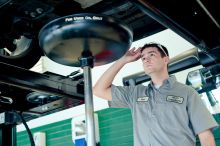
Our Concord Auto Techs Answer Fuel System Questions
 The fuel system stores fuel for delivery to the engine. It’s very important to keep this system clean.
The fuel system stores fuel for delivery to the engine. It’s very important to keep this system clean.If your car has to struggle to deliver the gas, it can affect fuel economy and even engine performance.
Today, our ASE-certified technicians in Concord are answering common questions about the fuel system.
But first, it’s important to understand what the fuel system entails. The parts of the fuel system include:
- Fuel pump
- Fuel filters
- Injection lines
- Carburetor (in older vehicles)
How can I tell my fuel pump isn’t working?
Signs the fuel pump isn’t working include:
- Sputtering sounds
- Stalling
- Failure to start
- Loss of power when accelerating
Our professionals typically see this problem in vehicles with 60,000 miles or more. There’s always a chance that there’s a problem with another engine component.
To verify the pump is still working, have someone turn the key of your car just so that they battery comes on. While your friend does that, take your gas cap off and listening to the opening. You should be able to hear the fuel pump hum for two or three seconds after the key is turned, if it’s still working.
What can I do to prevent fuel system damage?
Keeping the system clean is the best way to make sure fuel is properly pumped to the engine. Fuel filters are in place to make sure debris doesn’t enter into the fuel system. However, if these become clogged or worn, debris will contaminate the system and put stress on it.
Fuel system tip: never fill up on gas when a tanker-truck is filling the station tanks. This will stir debris-particles that have settled and they will find their way to your own gas tank.
When should I service my system?
Our specialists suggest a complete fuel system cleaning every 15,000 miles, or once a year, to keep it in peak condition. If you start to notice your car using more gas than usual, or your car doesn’t accelerate fast enough on the highway, call Christian Brothers Automotive in Concord, North Carolina.

[1].jpg)
Sunwash-Tech-with-Customer.jpg)




